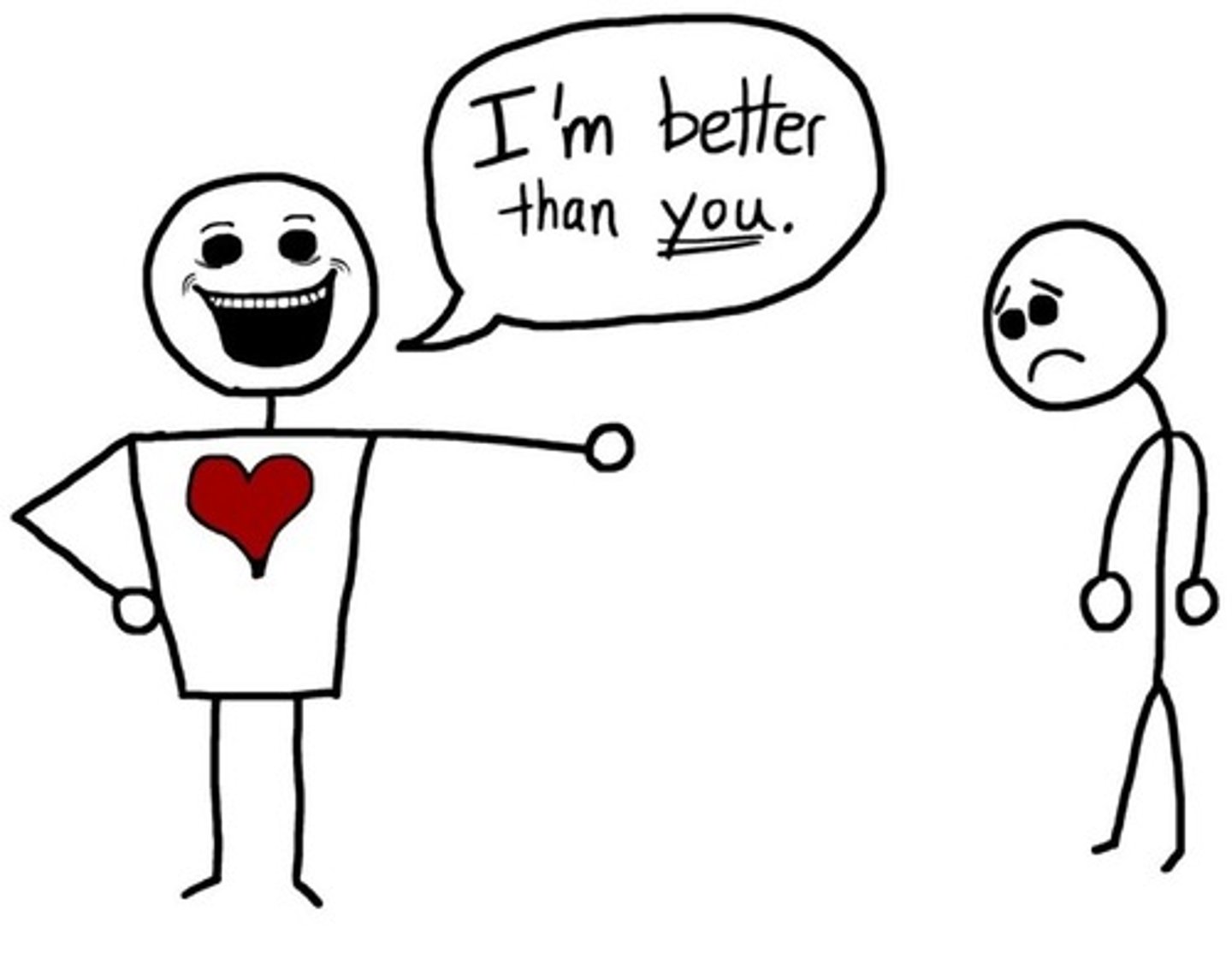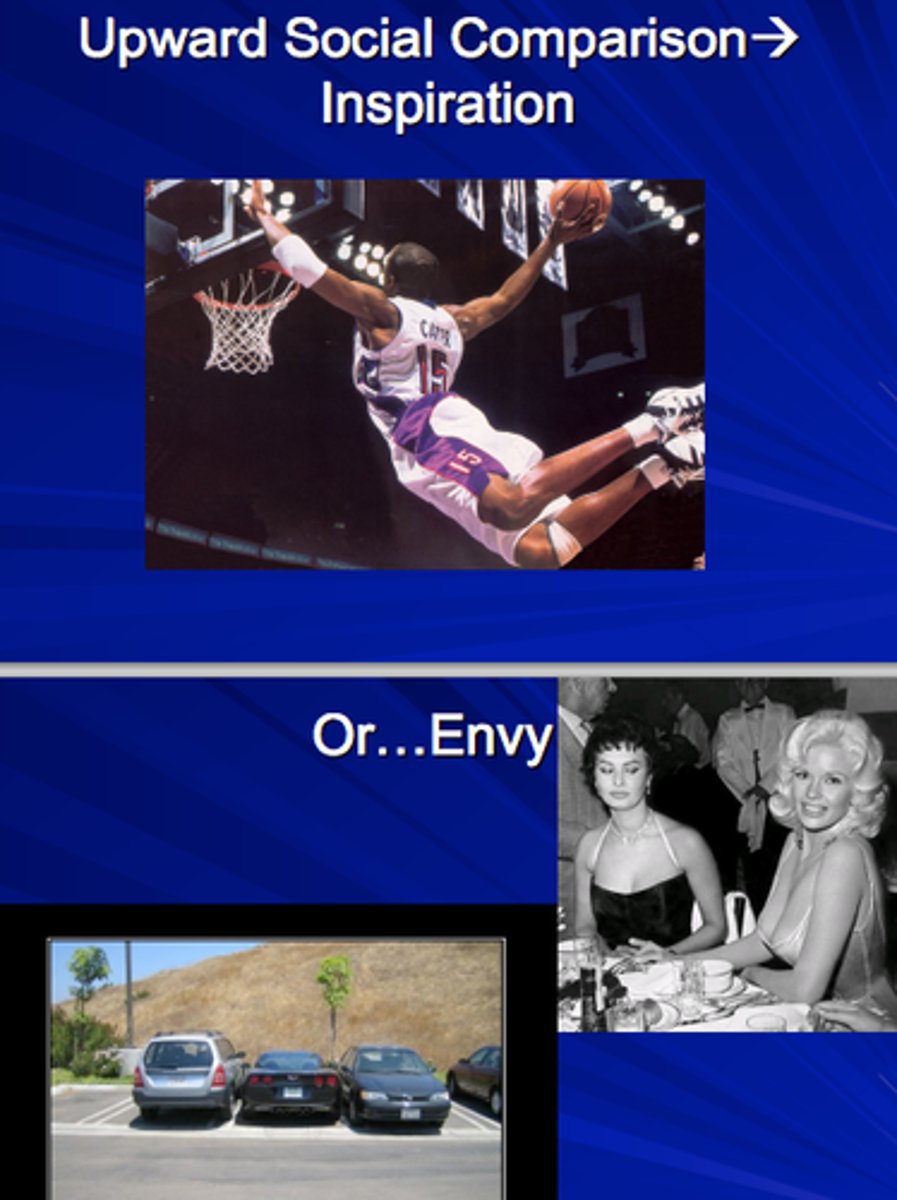Unit 4 Part 1: Unit 4.1-4.3 Social Psychology
1/50
There's no tags or description
Looks like no tags are added yet.
Name | Mastery | Learn | Test | Matching | Spaced |
|---|
No study sessions yet.
51 Terms
Attribution Theory
the theory that we explain someone's behavior by crediting either the situation or the person's disposition
Attributions
people's explanations for why events or actions occur
Fundamental Attribution Error
the tendency for observers, when analyzing another's behavior, to underestimate the impact of the situation and to overestimate the impact of personal disposition
Just-world phenomenon
the tendency for people to believe the world is just and that people therefore get what they deserve and deserve what they get
Self-Serving Bias
the tendency for people to take personal credit for success but blame failure on external factors
hindsight bias
the tendency to believe, after learning an outcome, that one would have foreseen it
Individualist Cultures
cultures in which the self is regarded as autonomous, and individual goals and wishes are prized above duty and relations with others
USA, Canada
Collectivist Cultures
cultures in which people subordinate their personal goals to those of a stable community
Japan, China
Central Route to Persuasion
When people make decisions based upon factual information, logical arguments, and a thoughtful analysis of pertinent details.
Peripheral Route to Persuasion
When people make decisions based upon emotional appeals and incidental cues.
foot-in-the-door phenomenon
the tendency for people who have first agreed to a small request to comply later with a larger request
Cognitive Dissonance
(Leon Festinger) an unpleasant state that arises when a person recognizes the inconsistency of his or her actions, attitudes, or beliefs
Social Facilitation
improved performance on simple or well-learned tasks in the presence of others
Social Inhibition
The tendency to perform tasks more poorly or more slowly in the presence of others
Social Loafing
the tendency for people in a group to exert less effort when pooling their efforts toward attaining a common goal than when individually accountable
Deindividualization
loss of self awareness and self restraint, typically in a sense of anomie (mob situation)
Stanford Prison Experiment
Philip Zimbardo's study of the effect of roles on behavior. Participants were randomly assigned to play either prisoners or guards in a mock prison. The study was ended early because of the "guards'" role-induced cruelty. Deindividualization
Bystander Effect
the tendency for any given bystander to be less likely to give aid if other bystanders are present
Group Polarization
the enhancement of a group's prevailing attitudes through discussion within the group
Groupthink
the mode of thinking that occurs when the desire for harmony in a decision-making group overrides a realistic appraisal of alternatives
Conformity
Adjusting one's behavior or thinking to coincide with a group standard.
Normative Social Influence
influence resulting from a person's desire to gain approval or avoid disapproval
Asch Conformity Experiment
Subjects shown a "standard line" and asked to pick the matching line from A, B, and C; other people in room purposely pick wrong line and subjects would follow. More likely to follow the larger the group. Less likely if there were other dissenters.
Obedience
Performance of an action in response to the direct orders of an authority or person of higher status.
In-group bias
the tendency to favor one's own group
Out-group bias
tendency to view all individuals outside our group as highly similar
Prejudice
preconceived opinion that is not based on reason or actual experience (feeling)
Discrimination
unjustifiable negative behavior toward a group and its members (action)
Stereotype
A generalized belief about a group of people
Mere-Exposure Effect
the tendency for liking to increase with the frequency of exposure
frustration-aggression hypothesis
the principle that frustration- the blocking of an attempt to achieve some goal- creates anger which can generate aggression
Reciprocity Norm
an expectation that people will help, not hurt, those who have helped them
Altruism
unselfish regard for the welfare of others
Social Exchange Theory
the theory that our social behavior is an exchange process, the aim of which is to maximize benefits and minimize costs
Scapegoat Theory
the theory that prejudice offers an outlet for anger by providing someone to blame
out-group homogeneity
tendency to view all individuals outside our group as highly similar
superordinate goals
shared goals that override differences among people and require their cooperation
social trap
a situation in which the conflicting parties, by each rationally pursuing their self-interest, become caught in mutually destructive behavior
Prisoner's Dilemma
a particular "game" between two captured prisoners that illustrates why cooperation is difficult to maintain even when it is mutually beneficial
Deindividuation
the loss of self-awareness and self-restraint occurring in group situations that foster arousal and anonymity
Milgrim Experiment
an experiment devised in 1961 by Stanley Milgrim to see how far ordinary people would go to obey scientific authority figure (shock experiment)
reward theory of attraction
the theory that we like those whose behavior is rewarding to us or whom we associate with rewarding events
optimistic explanatory style
a habitual tendency to attribute negative events to external, unstable, and specific causes, and positive events to internal, stable, and global causes
pessimistic explanatory style
a tendency to explain bad events that happen in a self-blaming manner, viewing their causes as global and stable
Downward Social Comparison
comparing ourselves to people who are worse than we are with regard to a particular trait or ability

Upward Social Comparison
comparing ourselves to people who are better than we are with regard to a particular trait or ability

Relative Deprivation
the perception that one is worse off relative to those with whom one compares oneself
belief perseverance
clinging to one's initial conceptions after the basis on which they were formed has been discredited
Social Trap
a situation in which the conflicting parties, by each rationally pursuing their self-interest, become caught in mutually destructive behavior
social contagion
imitative behavior involving the spread of behavior, emotions, and ideas
chameleon effect
The tendency for individuals to nonconsciously mimic the postures, mannerisms, facial expressions, and other behaviors of one's interaction partners.